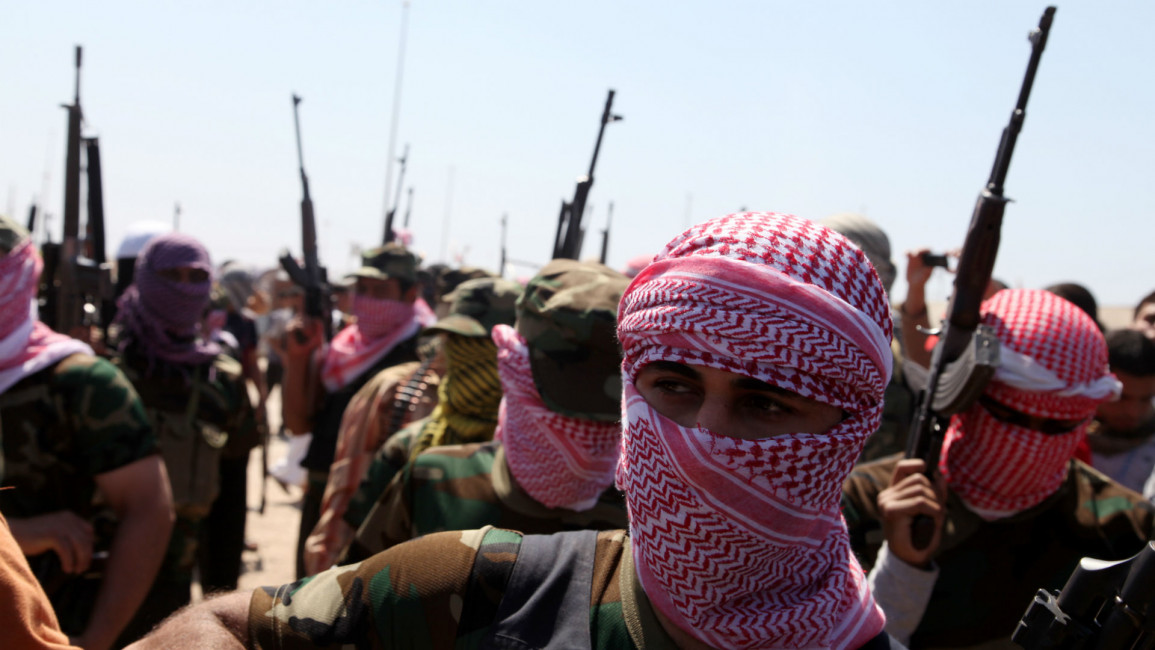Top Iraqi politicians: we created sectarian firestorm
Top Iraqi politicians: we created sectarian firestorm
Those who took over the running of Iraq after the US invasion are to blame for the "fire of sectarianism", prominent Iraqi political figures have admitted.
2 min read
Sectarian conflict has become the major fissure in Iraqi politics [Getty]
Former deputy prime minister Bahaa al-Araji has said that the politicians who took over the country after the US occupation are the main cause of widespread sectarianism tensions in Iraq today.
"The politicians that came after the [US] occupation have created the sectarianism in Iraqi society. When we political leaders and parties arrived on the scene we had no popular support," the leader in the Shia Sadrist Movement said on Monday in a televised interview.
"We began talking about sectarianism to garner support. We have created a sectarian support base in Iraq, that's what's happened," Araji added.
Since the 2003 invasion of Iraq, sectarian conflict between the Shias and Sunnis has become the major fissure in Iraqi politics and lead to the emergence of extremism and the Islamic state group [IS].
Former Iraqi prime minister Ayad Allawi also recently spoke out about the endemic issue.
"We are responsible for what has happened in Iraq after Saddam Hussein's regime was toppled. Iraqis are now begging the old regime for forgiveness because of the governments that have burnt them alive with the fire of sectarianism," the former member of the US-appointed Iraqi Governing Council said.
Member of the Sunni Popular Front Movement, Wail al-Obaidi, told The New Arab: "The political class that came into power with the US tanks have used religion and sectarianism to their advantage."
The politicians' comments come after a recent resurgence of sectarian violence in Diyala province, where Sunni mosques and shops were bombed after IS suicide bombers targeted a cafe popular with Shia militiamen.
Iraq's top Shia religious authority, Grand Ayatollah Ali al-Sistani, condemned the violence and urged the government to prevent it from happening again.
They also come as tensions are still high between Saudi Arabia and Iran over the Saudi execution of Shia cleric Sheikh Nimr al-Nimr and condemnation by Iran that led to the attack and torching of the Saudi embassy in Tehran last month.
Thousands of members and supporters of powerful Shia militias demonstrated last month in Baghdad against Nimr's execution.
"The politicians that came after the [US] occupation have created the sectarianism in Iraqi society. When we political leaders and parties arrived on the scene we had no popular support," the leader in the Shia Sadrist Movement said on Monday in a televised interview.
"We began talking about sectarianism to garner support. We have created a sectarian support base in Iraq, that's what's happened," Araji added.
Since the 2003 invasion of Iraq, sectarian conflict between the Shias and Sunnis has become the major fissure in Iraqi politics and lead to the emergence of extremism and the Islamic state group [IS].
Former Iraqi prime minister Ayad Allawi also recently spoke out about the endemic issue.
"We are responsible for what has happened in Iraq after Saddam Hussein's regime was toppled. Iraqis are now begging the old regime for forgiveness because of the governments that have burnt them alive with the fire of sectarianism," the former member of the US-appointed Iraqi Governing Council said.
 |
|
| Araji has blamed himself and other politicians [Getty] |
The politicians' comments come after a recent resurgence of sectarian violence in Diyala province, where Sunni mosques and shops were bombed after IS suicide bombers targeted a cafe popular with Shia militiamen.
Iraq's top Shia religious authority, Grand Ayatollah Ali al-Sistani, condemned the violence and urged the government to prevent it from happening again.
They also come as tensions are still high between Saudi Arabia and Iran over the Saudi execution of Shia cleric Sheikh Nimr al-Nimr and condemnation by Iran that led to the attack and torching of the Saudi embassy in Tehran last month.
Thousands of members and supporters of powerful Shia militias demonstrated last month in Baghdad against Nimr's execution.



